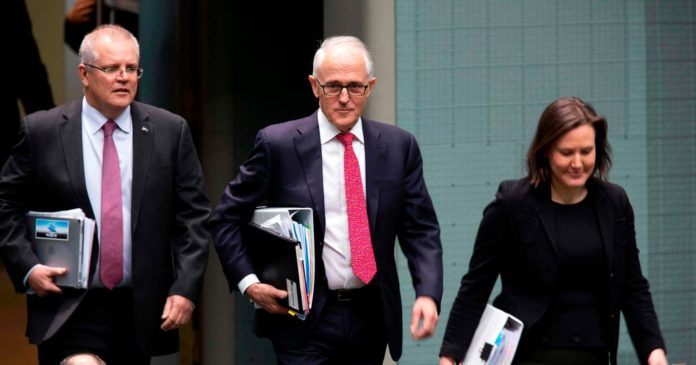The Australia Letter is a weekly newsletter reflecting the experience (and quirks) of our Australia bureau chief. Sign up to get it by email. Here’s where to find all our Australia and New Zealand coverage.
______
If there was a moment that summed up the feral nature of Australian politics, it must have been when the House of Representatives voted to adjourn Thursday so that the challenge to Malcolm Turnbull’s leadership could work its way out.
I was in Parliament House, and the debate made me think of the look our pup gave me when I caught her chewing my favorite books from college. She seemed ashamed, but would she really change?
Democracy these days doesn’t have much more self-control than that little mutt. Australia is part of a larger trend. In country after country, leaders elected to act on our behalf are encouraging or being threatened by venal instincts and dark urges.
Of course, the dysfunction on display in Canberra (here’s our story on that) is not new. In fact, many sociologists and political scientists will tell you, the unraveling here and elsewhere has been generations in the making.
For decades, the ranks of people who run for office in Australia, the United States and in many other “mature” democracies have narrowed. Parties have become less representative of the people. Technology has moved faster and with more menace than our public institutions, and at the same time media has become more agenda-driven, more divisive — and more threatened by disruption.
The elected leaders who are supposed to be dealing with all of this, in simple terms, are not. That’s why the adjournment is worth dwelling on. A handful of politicians stopped working on issues affecting the country for a contest to decide the country’s direction through a backroom deal unrelated to voter demands or an actual election.
The polis got rolled. Is it any wonder that growing numbers of voters in Australia (and it’s not just here) are falling out of love with democracy?
And remember, dark humor on social media notwithstanding, there may be long-lasting effects to political failures like the ones we’re seeing. To break up with politics or rage against the machine — these are fast becoming more popular options.
The Trump presidency is one result. Many Americans told pollsters they were just so done with the status quo that they bet on a risky unknown.
Australia’s lack of a climate and energy policy is another consequence, as I wrote this week in a story that analyzed why this country is both especially vulnerable to climate change and so unable to address it.
But there are more knock-on effects likely — problems that will go unsolved and opportunities missed because of time and effort spent on squabbling.
What are the issues that you see government, in Australia or wherever you live, failing to deal with in this moment of distraction? What is being lost because of representative democracy’s hour (era?) of discontent?
Share your views in the comments, by emailing nytaustralia@nytimes.com, or in our NYT Australia Facebook group.
Now for our stories of the week, and don’t worry, it’s not all darkness and despair!
______
From the world of science: Researchers discovered an extraordinary 90,000-year-old fossil in a Siberian cave that suggests the prehistoric world was filled with “hybrid” humans.
The owner of this ancient bone fragment had parents from two branches of ancient humans, each lineage separated by hundreds of thousands of years of evolution. If these humans could get along, why can’t … Well, you get the idea.
______
Bloody noses, fractured cheekbones and concussions — welcome to Botaoshi, a chaotic Japanese sport that fuses rugby, sumo and martial arts.
Many schools have abandoned it (for obvious reasons) but the tradition of “topple the pole” persists. You have to watch the video. It makes Rugby League look like a gentle frolic among daisies.
• After the first leadership spill of the week, I tried to explore a question the world was asking: Why is climate change so hard for Australian politics?
• You may have missed this among all the Canberra drama this week — Australia has barred Chinese technology giant Huawei from building a 5G network due to cyberespionage concerns. Another Chinese company, ZTE, has also been barred.
• Some Australian prisoners are being held in custody for up to 14 months with no conviction and no access to drug rehabilitation. There’s money to spend fixing New South Wales’s backlogged system — but it’s not being fixed, experts say.
• Think you know Melbourne pretty well? Prove it! We made a quiz that we reckon is pretty tough. Join us in the Facebook group to show off (or commiserate) about your results.
• Our restaurant critic and columnist Besha Rodell digs into the dining boom of the Northern Rivers area of New South Wales. One town is missing though: Byron Bay.
• Great to see “Mystery Road,” starring Aaron Pedersen and Judy Davis, being praised ahead of its American release this week. What do you think of this take from the review?
“It’s also bracing to see the way in which the lives and concerns of the Indigenous characters are given precedence without the self-consciousness, or self-congratulation, that sometimes marks American productions’ treatment of African-American or Native American characters in similar stories.”
• As Australia’s government squabbled, New Zealand’s government continued its campaign to make its neighbor look bad. This week one of its ministers, 42 weeks pregnant, leisurely cycled to the hospital to have her baby.
• And in this week’s Australia Diary, a reader with a migrant history of her own finds it’s easy to make a meaningful connection, if you show you’re interested in really listening.
… And We Recommend
Peace and quiet. And sleep. All of which I haven’t had enough of this week. Also: Aretha Franklin.
Source : Nytimes













